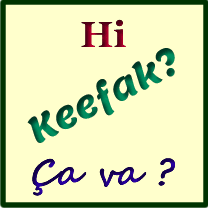People who make language learning apps, online language courses and similar sometimes contact me asking me to review their apps/courses, and to link to them / promote them on Omniglot. This is often in exchange for free use of their courses for a certain period. This is exactly the kind of thing I hoped might happen when I set up Omniglot. Well, actually I hoped that language schools might offer me free or reduced rate courses in other countries – back in 1998 there weren’t so many online courses about, and no language learning apps – and I thought that one day I would be going from country to country learning languages, at least part of the time.
In the course descriptions for these apps/courses they say that they will teach you the real language that you need to know, and often promise that the course won’t bore you with complex grammar or befuddle you with grammatical terms. They also might say that their courses provide new, innovative, never-before-seen ways to learn languages quickly and easily.
I’ve tried quite a few of these apps and courses, and generally they are variations on the same basic model: you learn a bunch of phrases, often travel-related, maybe with pictures, and are tested on them, often using some kind of spaced repetition system. Some courses give you a chance to make sentences using the words you’ve learnt. Some include a bit of grammar as well, but not too much, as that’s boring and might scare the horses.
I’m not trying to belittle all the work that goes into these courses, and the people who make them do seem to believe that their courses are truely innovative. However I rarely find anything genuinely new in them.
One app I heard about recently is Smigin, which is free and available for iOS and Android. It teaches you basic travel-related phrases, and has a neat feature that you can construct your own phrases and hear them spoken. The recordings give you an idea of pronounciation, but as each part is recorded separately they do not give you the best model for how to pronounce the whole phrase. The people at Smigin are also planning to create an app to teach you more language beyond the travel phrases – Smigin Pro, which looks like it will be an expanded version of the travel app, with a few extra features, like a way to practise conversations virtually, and videos. Most importantly it is “without the hassle of grammar rules.”
After trying Smigin Travel I starting thinking about how a similar system might be used to teach you those dreaded grammar rules. I’m not sure exactly how, but have a few ideas.

